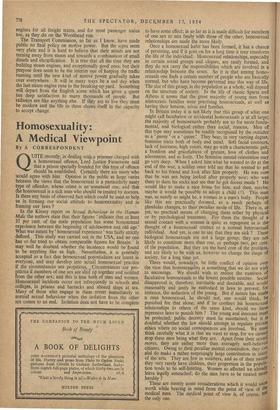A Medical Viewpoint
By A CORRESPONDENT QUITE recently, in dealing with,a prisoner charged with a homosexual offence, Lord 4stice Finnemore said that a prison specially founded for this type of offence should be established. Certainly there are many who would agree with him. Opinion in the public at large varies between the views that the homosexual is a particularly nasty type of offender, whose crime is an unnatural one, and that the homosexual is a sick man who should be treated by doctors. Is there any basis of observed fact which could be used to help us in forming our social attitude to homosexuality and in framing our laws ? , In the Kinsey report on Sexual Behaviour in the Human Male the authors state that their figures ' indicate that at least 37 per cent. of the male population has some homosexual experience between the beginning of adolescence and old age.' What was meant by ' homosexual experience' was fairly strictly defined. This study was carried out in the USA, and no one has so far tried to obtain comparable figures for Britain. It may well be doubted whether the incidence would be found to be anything like as high. Nevertheless, it is generally accepted as a fact that homosexual potentialities are latent in everyone, and may develop into actual homosexual practice if the circumstances are propitious., are pro- pitious if members of one sex are shut up together and isolated from the other sex; and this is true both of men and women. Homosexual incidents occur not infrequently in schools and colleges, in prisons and barracks and aboard ships at sea. Many of those who engage in them revert immediately to normal sexual behaviour when the isolation from the other sex comes to an end. Isolation does not have to be complete to have some effect; in so far as it is made difficult for members of one sex to-mix freely with those of the other, homosexual relationships are made the more likely. Once a homosexual habit has been formed, it has a chance of persisting, and if it goes on for a long time it may transform the life of the individual. homosexual relationships, especially in certain social groups and cliques, are easily formed, and they do not carry the responsibilities which are involved in a relationship between the sexes. So it is that among homo- sexuals one finds a certain number of people who are basically normal, but who have become perverted into this way of life.
The size of this group, in the population as a whole, will depend on the structure of society. In the life of classic Sparta and Athens it seems that the great majority of young men from aristocratic families were practising homosexuals, as well as having their hetairm, wives and families.
In Britain today it is not likely that this group of what one might call facultative or accidental homosexuals is at all large; the majority of homosexuals probably are so for more funda- mental, and biological rather than social, reasons. Men of this type may sometimes he readily recognised by the outsider as a ' pansy ' or a queer.' They bear, in very varying degree, feminine traits both of body and mind. Soft facial contours, lack of hairiness, high voices, may go with a characteristic gait, a freedom and gracefulness of gesture, love of clothes and adornment, and so forth. The feminine mental orientation may go very deep. When I asked him what he wanted to do at the end of the war, a soldier once told me that he wanted to get back to his friend and look after him properly. He was sure that he was not being looked after properly now; who was there to darn his socks and see that he got decent meals ? He would like to make a nice home for him, and then, maybe, maybe it would be possible to adopt a child (1). This man was, as nearly as might be, a woman in a man's body. People like this are practically doomed, as a result perhaps of glandular changes, to their peculiar mode of life. There is, as yet, no practical means of changing them either by physical or by psychological treatment. For them the thought of a sexual contact with a woman is quite as repugnant as is the thought of a homosexual contact to a normal heterosexual individual. And yet, is one to say that they are sick ? These biological homosexuals are not a large group; they are not likely to constitute more than one, or perhaps two, per cent. of the population. But they are the hard core of the problem. and are likely to be with us, however we change the shape of society, for a long time yet. There would, nowadays, be little conflict of opinion over the view that homosexuality is something thatwe do not wish to encourage. We should wish to reduce the numbers of facultative homosexuals to the lowest possible number. Social disapproval is, therefore, inevitable and desirable, and would


































 Previous page
Previous page